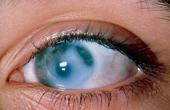What to Look for in Glaucoma

Glaucoma can suddenly and silently steal vision, crept up like a thief in the night. Like cataracts, glaucoma usually proceeds painlessly and in the early stages without symptoms. The National Glaucoma Research Center found that about 50 million people around the world suffer from impaired vision and / or loss of vision due to this disease.
Glaucoma is actually a whole complex of diseases characterized by constantly changing eye pressure, which can damage the eye nerve - a bundle of more than one million( !) Filaments that connects the retina of the eye, a photosensitive layer of tissue on the back of the eye, and the brain. Good vision depends on the condition of the optic nerve.
In many cases, by the time glaucoma loss of vision becomes apparent, the cells of the optic nerve have already been irretrievably destroyed and vision has disappeared forever.
Glaucoma - the main cause of blindness - affects 2% of the population after the age of 40, and over the years is even more common. And yet, if due to regular careful examinations it was possible to detect and begin to treat glaucoma at an early stage, vision can almost always be saved.
No one is immune from glaucoma, but some people have a higher risk of getting sick than others. The Baltimore Eye Research Department, with the support of the National Eye Institute, showed that by the age of 70 about one in 50 Europeans developed glaucoma. In African Americans, the situation is even more serious: by the age of 70, one in eight has this disease. In general, the risk of glaucoma is increased if:
- you are older than 40 years;
- you are of African-American origin;
- in your family there are cases of this disease;
- you have increased intraocular pressure;
- you have had a serious eye damage in the past.
Diabetes, severe myopia or hyperopia, persistent use of steroids, anemia and shock and( or) Scandinavian, Irish or Russian origin - all these factors indicate that the risk of occurrence of one type of glaucoma increases. The reason why glaucoma appears in older people is not clear, but like other physiological processes that appear with age, the drainage system of the eye also begins to work less efficiently.
Yu. Saveleva "Methods of vision improvement"
